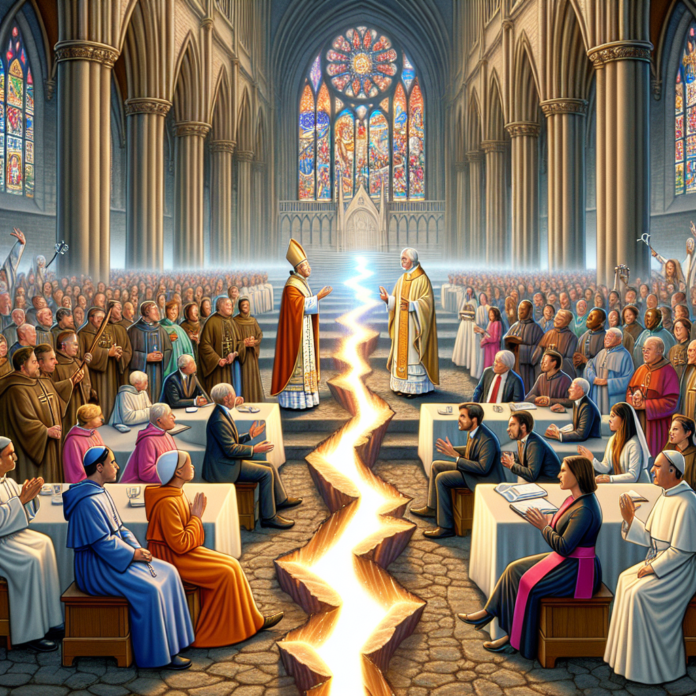The Controversy of Father Leonard Feeney and the Doctrine of "Extra Ecclesiam Nulla Salus"
The Catholic Church has long been a bedrock of theological discourse and evolving doctrines. One of the most contentious debates in recent history has centered around the doctrine of "extra Ecclesiam nulla salus," which translates to "no salvation outside the Church." This principle has found its most ardent and controversial advocate in Father Leonard Feeney and his followers.
Historical Background
The doctrine originates from early Christian writings and was notably emphasized by St. Cyprian of Carthage. Over the centuries, the interpretation of this principle has evolved significantly, reflecting broader cultural, theological, and ecclesiastical developments. Yet it retained a level of ambiguity that St. Augustine, Thomas Aquinas, and later theologians would frequently revisit.
Father Leonard Feeney’s Position
In the mid-20th century, Father Leonard Feeney, a Jesuit priest based in Boston, took an unyielding stance on the doctrine. Feeney asserted emphatically that those not formally within the Catholic Church could not attain salvation. This radical interpretation garnered him a devoted following, but also cast him into conflict with mainstream Catholic teaching, which had been moving towards a more inclusive stance since the Second Vatican Council.
The Broader Church’s Position
Vatican II, which took place between 1962 and 1965, revolutionized many aspects of Catholic doctrine, aiming to modernize and make the Church more accessible. It included statements on religious freedom, dialogue with other religions, and ecumenism. The council fathers clarified that salvation was indeed possible for non-Catholics, provided they sought God with a sincere heart. This stance was diametrically opposed to Feeney’s rigid interpretation.
Contentions and Alienation
Feeney and his followers—commonly referred to as "Feeneyites"—openly clashed with Church authorities. The doctrinal rigidness advocated by Feeney and his disciples alienated numerous believers and contributed to a schismatic attitude within their community. Feeney’s followers were particularly critical of the open, accommodating stance endorsed by Vatican II and used the doctrine as a cudgel to critique the alleged "modernism" and "liberalism" creeping into the Church.
The Fallout
The controversy reached a head in 1949 when the Holy Office (now the Congregation for the Doctrine of the Faith) explicitly condemned Feeney’s interpretation, asserting a more nuanced understanding of extra Ecclesiam nulla salus. Feeney was ultimately excommunicated in 1953 for his refusal to heed Church authorities and his persistence in teaching what was viewed as an extremist position.
Feeney’s excommunication sent ripples through the Catholic community, highlighting broader tensions between traditionalist and progressive elements within the Church. Many traditionalists—both within and outside Feeney’s immediate circle—viewed this as a capitulation to contemporary secular values. Yet, for a significant portion of Catholics, the excommunication of Feeney signaled the Church’s commitment to an inclusive doctrine more in keeping with Christ’s message of love and universal salvation.
Traditionalist Intransigence
Feeney’s followers have remained steadfast, almost alarmingly so, in their refusal to accept Vatican II’s revisions. In this refusal lies a disturbing penchant for theological isolationism that undermines the Church’s mission to be a unifying force in an increasingly pluralistic world. This brand of traditionalism shuns dialogue, fosters division, and engenders a quasi-fundamentalist mindset more akin to Puritanism than Catholicism.
Traditionalists cling to bygone centuries, ignoring the Holy Spirit’s guidance through modern Church teachings. They distort and weaponize centuries-old doctrines for their narrow purposes, all under a misguided banner of ‘purity’ and ‘authenticity.’ Such myopia not only alienates non-Catholics but also casts a pall over the inclusive, merciful, and compassionate essence that Catholicism aspires to uphold.
Contemporary Implications
The Church today emphasizes a pastoral approach that resonates with contemporary challenges while remaining rooted in timeless truths. Those who rally behind Feeney’s myopic vision jeopardize this balanced approach, perpetuating a view of Catholicism that is rigid, inhospitable, and fundamentally at odds with the Christocentric ethos of love and mercy.
Moreover, the traditionalist insistence on exclusivity not only disrupts internal harmony but also stymies intellectual growth and spiritual maturity. The richness of Catholicism lies in its depth, diversity, and ability to evolve — attributes that traditionalists, in their obstinacy, appear intent on denying.
Conclusion
Father Leonard Feeney and his followers’ rigid stance on extra Ecclesiam nulla salus epitomizes the dangers of theological dogmatism. Their insularity and refusal to adapt to contemporary insights have rendered their tradition a relic, rather than a living, breathing faith. As the Church moves forward, it must navigate these waters carefully, ensuring that it remains inclusive, compassionate, and true to the all-encompassing message of Christ. Traditionalism, when wielded as a tool of exclusion and division, does not manifest the divine but rather distorts and confines it, hampering broader spiritual and communal progress.
